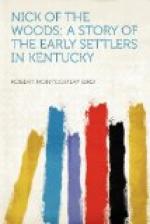In the meanwhile, Nathan had gathered more wood to supply the fire during the night, and added a new stock of cane-leaves for his own bed; having made which to his liking, disposed his arms where they could be seized at a moment’s warning, and, above all, accommodated little Peter with a couch at his feet, he also threw himself at length, and was soon sound asleep.
CHAPTER XXV.
The morning-star, peeping into the hollow den of the wanderers, was yet bright on the horizon, when Roland was roused from his slumbers by Nathan, who had already risen and prepared a hasty meal resembling in all respects that of the preceding evening. To this the soldier did better justice than to the other: for, although feeling sore and stiff in every limb, he experienced none of the feverish consequences Nathan had predicted from his wounds; and his mind, invigorated by so many hours of rest, was more tranquil and cheerful. The confidence Nathan seemed to feel in the reasonableness and practicability of their enterprise, however wild and daring it might have seemed to others, was his own best assurance of its success; and hope thus enkindled and growing with his growing strength, it required no laborious effort to summon the spirits necessary to sustain him during the coming trials.
This change for the better was not unnoticed by Nathan, who exhorted him to eat freely, as a necessary prelude to the labours of the day; and the rude meal being quickly and satisfactorily despatched, and little Peter receiving his due share, the companions, without further delay, seized their arms, and recommenced their journey. Crossing the river at the buffalo-ford above, and exchanging the road to which it led for wilder and lonelier paths traced by smaller animals, they made their way through the forest, travelling with considerable speed, which was increased, as the warmth of exercise gradually restored their native suppleness to the soldier’s limbs.
And now it was, that, as the opening of a glorious dawn, flinging sunshine and life over the whole wilderness, infused still brighter hopes into his spirit, he began to divide his thoughts between his kinswoman and his guide, bestowing more upon the latter than he had previously found time or inclination to do. His strange appearance, his stranger character, his sudden metamorphosis from a timid and somewhat over-conscientious professor of the doctrines of peace and good-will, into a highly energetic and unremorseful, not to say, valiant man of war, were all subjects to provoke the soldier’s curiosity; which was still further increased when he pondered over the dismal story Nathan had so imperfectly told him on the past day. Of those dreadful calamities which, in Nathan’s own language, “had made him what he was,” a houseless wanderer of the wilderness, the Virginian would gladly have known more; but his first allusion to the subject produced such evident disorder in Nathan’s mind,




